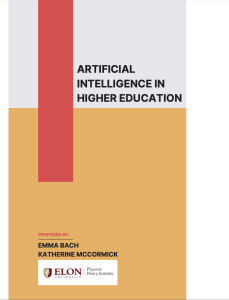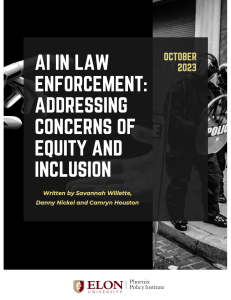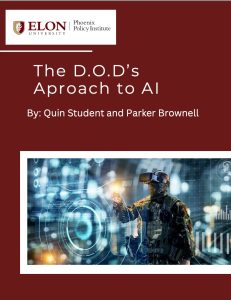- Home
- Academics
- Arts & Sciences
- Political Sciences
- Phoenix Policy Institute
- Artificial Intelligence
Artificial Intelligence
Fall 2023: Artificial Intelligence
Environment
AI and Transmission Lines: Bolstering America’s Energy Grid with Renewables
 By: Brandon Emons and Curran Gilster
By: Brandon Emons and Curran Gilster
Published: Fall 2023
Abstract: Climate change is affecting communities across the country. To address climate changeand shift to renewable energy, America must construct more interstate transmission networks. By using AI to sift through large data sets, the federal government can expedite the review and permitting processes for constructing transmission lines on federal lands. Additionally, AI technology can be used to bolstering existing transmission networks by allowing operators to quickly detect power outages.
Higher Education
Artificial Intelligence in Higher Education
By: Emma Bach and Katherine McCormick
Published: Fall 2023

Abstract: The following policy memo will analyze the current and future role for Artificial Intelligence (AI) in higher education, emphasizing the need for a policy solution. As AI continues to grow and develop in society, it is important for higher education to adapt alongside technological advancements. The memo explores the shortcomings of outright bans on AI usage in academic settings and highlights the increasing use of AI for administrative tasks and grading processes. Proposed policy solutions include defining clear guidelines for AI usage, integrating AI literacy into the curriculum, and hiring specialists to educate both faculty and students. Ensuring effective AI coexistence and preparing students for a future where AI is prevalent in the workforce might become a new purpose for higher education.
Law Enforcement
AI In Law Enforcement: Addressing Concerns of Equity and Inclusion
 By: Camryn Houston, Danny Nickel and Savannah Willette
By: Camryn Houston, Danny Nickel and Savannah Willette
Published: Fall 2023
Abstract: The following report aims to understand how the use of Artificial Intelligence (AI) tools inpolice surveillance perpetuates patterns of racial profiling in policing, ethical implications in prosecution, and equity concerns for marginalized communities. By recognizing discriminatory realities, this paper will identify how public policy could begin to regulate law enforcement’s use of AI, producing a solution to address racial equity concerns in an under- regulated market.
National Defense
The Department of Defenses’ Approach to AI
By: Parker Brownell and Quin Student
Published: Fall 2023
Abstract: Much like the rest of the world, the United States Department of Defense (D.O.D.) is shifting towards the development and use of Artificial Intelligence (AI) in their military operations. Through observing developments in ongoing conflicts like Ukraine and attempting to stay ahead of rivals, the United States has begun investing in a range of AI initiatives that enhances decision making, intelligence gathering, and manpower supplementation. The D.O.D. is currently requesting over 3 billion dollars to research and develop this technology for 2023, over a billion dollar increase from 2019. As the further adoption of AI technology is inevitable, it is vital for lawmakers to understand its possible military applications to properly guide its development in a safe and ethical manner. AI should not be used to fully replace soldiers in armed conflict, instead it should be used to augment and support combatants in their duties.
